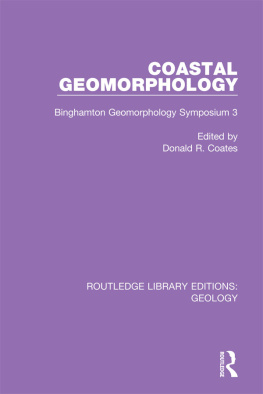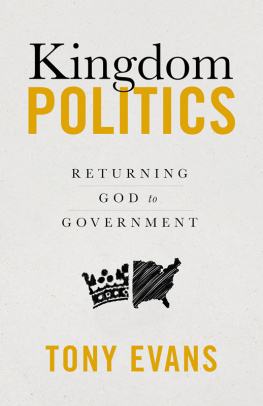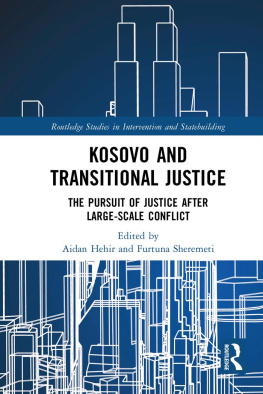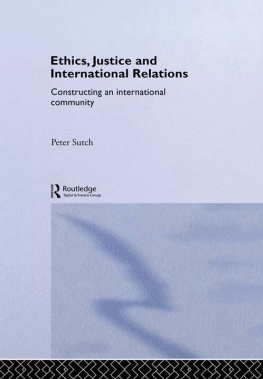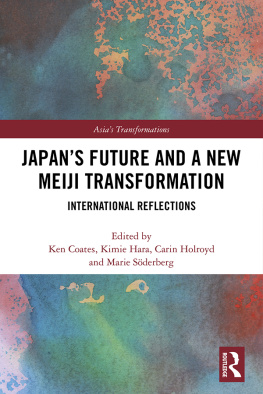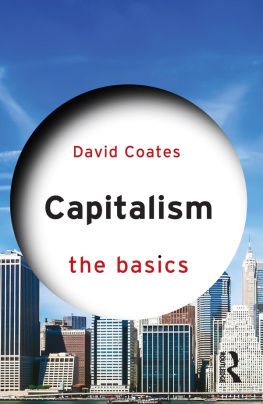International Justice
International Justice
Edited by
TONY COATES
Department of Politics
The University of Reading
First published 2000 by Ashgate Publishing
Reissued 2018 by Routledge
2 Park Square, Milton Park, Abingdon, Oxon OX14 4RN
711 Third Avenue, New York, NY 10017, USA
Routledge is an imprint of the Taylor & Francis Group, an informa business
Copyright The authors 2000
All rights reserved. No part of this book may be reprinted or reproduced or utilised in any form or by any electronic, mechanical, or other means, now known or hereafter invented, including photocopying and recording, or in any information storage or retrieval system, without permission in writing from the publishers.
Notice:
Product or corporate names may be trademarks or registered trademarks, and are used only for identification and explanation without intent to infringe.
Publisher's Note
The publisher has gone to great lengths to ensure the quality of this reprint but points out that some imperfections in the original copies may be apparent.
Disclaimer
The publisher has made every effort to trace copyright holders and welcomes correspondence from those they have been unable to contact.
A Library of Congress record exists under LC control number: 99085922
ISBN 13: 978-1-138-70327-8 (hbk)
ISBN 13: 978-1-315-20323-2 (ebk)
Contents
Tony Coates
Brian Barry
Chris Brown
Tony Coates
Michael Freeman
Lukas H. M eyer
Peter Jones
Simon Caney
Andreas Fllesdal
Matt Matravers
Barry Holden
Avner de-Shalit
Cecilia Albin
Rama Mani
Guide
Most of the papers on which these chapters are based were first presented at the 25th Annual Conference of the UK Association for Legal and Social Philosophy, held at the University of Reading in April 1998. The editor is most grateful to the officers of the Association, particularly Pat FitzGerald and Sandra Marshall, and to Richard Bellamy and Pat Hicks, his colleagues at Reading, for their help in organizing the conference. He is also greatly indebted to Pat FitzGerald for her preparation of the manuscript for publication in camera-ready form.
The UK Association for Legal and Social Philosophy (ALSP) is open to everyone interested in the interaction between theory and practice in the areas of legal, social and political thought; the interplay between these areas; and the applications and outcomes arising out of the inter-disciplinary nature of such debate. In seeking to extend debate beyond the traditional academy, it is especially concerned to include students and practitioners in its activities, as well as to promote discussion with, among and beyond full-time academics.
Membership is currently 35 (waged) or 17.50 (unwaged) per annum, and includes a subscription to Res Publica: A Journal of Social and Legal Philosophy and the Association's newsletter. For details, please write to the Treasurer, Henry Miller, 14 Southampton Street, Brighton, BN2 2UT or visit the Association's website at http://www.law.ed.ac.uk/alsp/ukalsp.htm.
TONY COATES
This book is based on the proceedings of the 25th Annual Conference of the UK Association of Legal and Social Philosophy held in 1998 at the University of Reading. Most of the chapters originated as papers delivered at the conference. Naturally, the book reflects the interests and approaches of the conference participants. It is not intended to - nor does it - provide either a representative sample of contemporary thinking about international justice or a comprehensive survey of its subject matter. As it happens, most of the contributions belong to a liberal-cosmopolitan tradition of thought, though a tradition that is broadly enough defined to leave ample room for disagreement and argument.
In Section 1 the 1998 Austin Lecturer, Brian Barry, poses the question, 'is there a right to development?'. That the keynote address at the conference should have been given by Barry seems fitting, given his prominence in the contemporary debate about international justice, and the number of contributions to this volume that engage with Barry's work is evidence of his widespread influence. In the lecture Barry examines the idea of a right to development contained in the UN Declaration. He argues that the main deficiency of the Declaration is its statist bias (its understanding of the right to development as a collective right) and its neglect of the key issue of sustainability. He concludes that what is required is the adoption and working out of a cosmopolitan and intergenerational perspective that addresses the needs of individuals rather than those of states and collectivities.
In Section 2 Chris Brown and Tony Coates examine the idea of international justice in relation to different traditions of political and international theory. Chris Brown charts the emergence of international justice as a topic of international relations theory, an emergence that he attributes as much to political events as to theoretical developments. Brown argues that in its earlier manifestations, international relations theory was uniformly hostile to considerations of justice, at least in any substantive sense. The root cause of this hostility was the dominance of realism in the thinking of the discipline's founding fathers. Brown sees the increasing prominence given to international justice as vindication of a more idealistic, openly critical (even Utopian) and constructivist approach to international relations.
Coates explores the just war concept of international justice. He argues that, by virtue of its classical natural law principles, the just war tradition is well placed to overcome the divide between realism and cosmopolitanism that is seen to mar discussion about international justice. The argument defends the claim that just war theory avoids the characteristic and damaging one-sidedness of other positions by giving due weight to both particularity and universality.
The chapters that make up Section 3 explore the principles and key concepts that inform the contemporary debate about international justice. Freeman and Meyer focus on the tension between particular and universal ties and obligations that activates most discussions. Michael Freeman's argument starts from the premise that '[i]f the concept of international justice is to be viable, ethical universalism must be vindicated'. At the same time, he acknowledges the ethical as well as the psychological force of particular attachments. The problem is seen to be one of reconciling the two, apparently conflicting, claims. His argument proceeds via a comparison of David Miller's ethical defence of nationalism with Brian Barry's argument for ethical universalism. Finding neither position entirely satisfactory, Freeman concludes by proposing the idea of 'cosmopolitan realism' - of an integrative and cosmopolitan form of nationalism that the adoption of a more complex, dispersed and multilayered, system of political authority might be expected to promote.
Lukas Meyer also focuses on the tension between 'loyalist' particularism and cosmopolitan universalism. While acknowledging that in some of its more abstract formulations liberal cosmopolitanism can appear indifferent to the particular attachments so dear to loyalists, Meyer argues that there is nothing inconsistent or incoherent about a cosmopolitan defence of particular values and loyalties - as long as it remains critical and discriminating. There, of course, lies the rub so far as international justice is concerned. Both Meyer and Freeman make it clear that cosmopolitan support for particular attachments is dependent upon acceptance of liberal values. In neither case, therefore, does universalism take a form that appears designed to respect the integrity and the worth of non-liberal societies and cultures.




